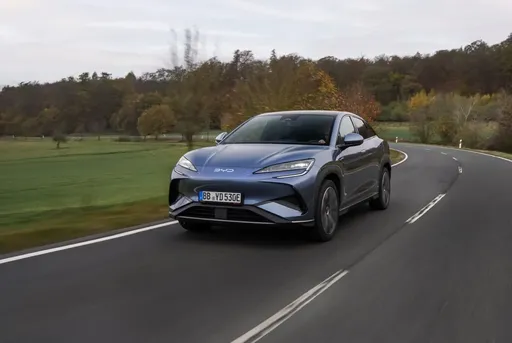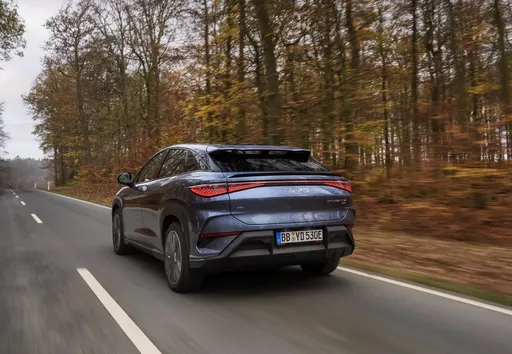Toyota Prius VS BYD Sealion 7 – Specs, Efficiency & Price Comparison
Which model is the better choice – the Toyota Prius or the BYD Sealion 7? We compare performance (223 HP vs 530 HP), boot capacity (284 L vs 520 L), efficiency (0.50 L vs 19.90 kWh), and of course, the price (39400 £ vs 41100 £).
Find out now which car fits your needs better!
The Toyota Prius (Hatchback) is powered by a Plugin Hybrid engine and comes with a Automatic transmission. In comparison, the BYD Sealion 7 (SUV) features a Electric engine and a Automatic gearbox.
When it comes to boot capacity, the Toyota Prius offers 284 L, while the BYD Sealion 7 provides 520 L – depending on what matters most to you. If you’re looking for more power, you’ll need to decide whether the 223 HP of the Toyota Prius or the 530 HP of the BYD Sealion 7 suits your needs better.
There are also differences in efficiency: 0.50 L vs 19.90 kWh. In terms of price, the Toyota Prius starts at 39400 £, while the BYD Sealion 7 is available from 41100 £.
Compare all the key specs now and find out which model fits your lifestyle best!
Toyota Prius
The Toyota Prius stands as a pioneer in the realm of hybrid vehicles, offering an eco-friendly driving alternative with its innovative technology. Its aerodynamic design and comfortable interior make it a practical choice for those looking to reduce their carbon footprint without sacrificing style. Additionally, the Prius boasts a reputation for reliability and efficiency, contributing to its lasting popularity among environmentally conscious drivers.
details @ Toyota
@ Toyota
 @ Toyota
@ Toyota
 @ Toyota
@ Toyota
 @ Toyota
@ Toyota
BYD Sealion 7
The Sealion 7 captivates with its striking design and impressive performance that appeals to both enthusiasts and casual drivers alike. With a focus on comfort and advanced technology, this model redefines the driving experience, making every journey enjoyable. Its sleek silhouette coupled with an innovative interior showcases the perfect blend of style and functionality.
details @ BYD
@ BYD
 @ BYD
@ BYD
 @ BYD
@ BYD

|

|
|
|
|
Costs and Consumption |
|
|---|---|
|
Price
39400 - 45800 £
|
Price
41100 - 50600 £
|
|
Consumption L/100km
0.5 - 0.7 L
|
Consumption L/100km
-
|
|
Consumption kWh/100km
-
|
Consumption kWh/100km
19.9 - 21.9 kWh
|
|
Electric Range
72 - 86 km
|
Electric Range
456 - 502 km
|
|
Battery Capacity
-
|
Battery Capacity
-
|
|
co2
12 - 17 g/km
|
co2
0 g/km
|
|
Fuel tank capacity
40 L
|
Fuel tank capacity
-
|
Dimensions and Body |
|
|---|---|
|
Body Type
Hatchback
|
Body Type
SUV
|
|
Seats
5
|
Seats
5
|
|
Doors
5
|
Doors
4
|
|
Curb weight
1620 - 1630 kg
|
Curb weight
2225 - 2435 kg
|
|
Trunk capacity
284 L
|
Trunk capacity
520 L
|
|
Length
4599 mm
|
Length
4830 mm
|
|
Width
1782 mm
|
Width
1925 mm
|
|
Height
1470 mm
|
Height
1620 mm
|
|
Payload
365 - 375 kg
|
Payload
410 kg
|
Engine and Performance |
|
|---|---|
|
Engine Type
Plugin Hybrid
|
Engine Type
Electric
|
|
Transmission
Automatic
|
Transmission
Automatic
|
|
Transmission Detail
CVT
|
Transmission Detail
Reduction Gearbox
|
|
Drive Type
Front-Wheel Drive
|
Drive Type
Rear-Wheel Drive, All-Wheel Drive
|
|
Power HP
223 HP
|
Power HP
313 - 530 HP
|
|
Acceleration 0-100km/h
6.80 s
|
Acceleration 0-100km/h
4.5 - 6.7 s
|
|
Max Speed
177 km/h
|
Max Speed
215 km/h
|
|
Torque
-
|
Torque
380 - 690 Nm
|
|
Number of Cylinders
4
|
Number of Cylinders
-
|
|
Power kW
164 kW
|
Power kW
230 - 390 kW
|
|
Engine capacity
1998 cm3
|
Engine capacity
-
|
General |
|
|---|---|
|
Model Year
2023
|
Model Year
2024
|
|
CO2 Efficiency Class
B
|
CO2 Efficiency Class
A
|
|
Brand
Toyota
|
Brand
BYD
|
Toyota Prius
The All-New Toyota Prius: Revolutionising Efficiency and Performance
The Toyota Prius, a name synonymous with hybrid innovation, has once again shown why it remains at the forefront of eco-friendly automotive technology. The latest models have enhanced technical features and innovations, setting new standards for efficiency and driving experience.
Hybrid Performance: A Leap Forward
The latest Prius models employ a sophisticated 2.0 litre Plug-in Hybrid system that flawlessly melds petrol and electric power. With a power output of 223 PS, it propels the Prius with impressive dynamism, reaching 0-100 km/h in just 6.8 seconds. This performance-oriented aspect of the Prius does not compromise on efficiency, with an astonishing fuel consumption ranging from 0.5 to 0.7 L/100km.
Electric Range and Efficiency
One of the key highlights of the new Prius is its substantial electric-only range. Depending on the variant, it can travel between 72 to 86 km on electric power alone, making it an ideal choice for urban commutes where zero emissions are preferred. The hybrid system's CO2 emissions are remarkably low, between 12 and 17 g/km, contributing to its CO2 Efficiency Class B rating.
Engineering Excellence with CVT
The Prius is equipped with a state-of-the-art Continuously Variable Transmission (CVT), ensuring a smooth and efficient drive. This advanced transmission supports the front-wheel-drive layout, delivering power seamlessly and enhancing driving pleasure without sacrificing fuel economy.
Stylish Design and Comfort
Designed as a sleek five-door hatchback, the Prius offers a comfortable and spacious interior with seating for five passengers. It measures 4599 mm in length, 1782 mm in width, and 1470 mm in height, offering a practical balance of size and comfort. The boot space, while tailored for the hybrid battery, still provides a decent 284 litres of storage.
Cost Efficiency
The running costs of the Prius are competitive, with monthly expenses estimated between €1064 and €1188, and cost per kilometre ranging from 42.6 to 47.5 cents. Its efficient design results in a maximum speed of 177 km/h and a practical fuel tank size of 40 litres, ensuring less frequent stops on longer journeys.
Conclusion: The Prius Legacy Continues
The Toyota Prius continues to lead by example in the realm of hybrid technology. Combining impressive power with unmatched efficiency and a sophisticated driving experience, it is clear that the Prius remains a compelling choice for the environmentally conscious driver. Its innovative features and favourable cost metrics only bolster its appeal in the modern automotive landscape.
BYD Sealion 7
The automotive landscape is evolving faster than ever, and one model capturing significant attention is the BYD Sealion 7. This electric SUV not only marries performance with sustainability but also boasts innovations that redefine user expectations. Let’s dive into the technical aspects and standout innovations of this remarkable vehicle.
Powerful Performance and Versatile Configurations
The BYD Sealion 7 comes in several configurations, catering to diverse performance needs. It offers two versions of electric all-wheel drive, producing an impressive 530 horsepower, while the rear-wheel drive variant delivers a solid 313 horsepower. This spectrum of power allows drivers to select an option that aligns with their driving style and requirements.
Acceleration is another noteworthy aspect of the Sealion 7. The rear-wheel drive model achieves 0-100 km/h in just 6.7 seconds, while the all-wheel drive variant does it in a breathtaking 4.5 seconds. This combination ensures that the Sealion 7 doesn’t just compete; it leads in performance within its segment.
Innovative Electric Drive and Efficiency
Equipped with a cutting-edge reduction gearbox, the BYD Sealion 7 not only delivers incredible acceleration but also underscores efficiency with a consumption rate as low as 19.9 kWh per 100 km for the most efficient model. The all-wheel drive variants have slightly higher consumption rates of 21.4 kWh and 21.9 kWh, respectively, but they still perform admirably when it comes to efficiency.
In terms of electric range, the Sealion 7 showcases a commendable performance. Depending on the specific configuration, it offers ranges between 456 and 502 km on a single charge, making it a competitive choice for those concerned about range anxiety typical of electric vehicles.
Sleek Design and Practicality
Beyond performance and efficiency, the BYD Sealion 7 impresses with its aesthetic appeal and practicality. With dimensions of 4830 mm in length, 1925 mm in width, and 1620 mm in height, this SUV is designed for presence. Moreover, the spacious interior comfortably accommodates up to five passengers, enhancing its usability for families and adventure seekers alike.
Practical features like a trunk capacity of 520 liters ensure that the Sealion 7 stands ready for any journey, whether it’s a weekend road trip or daily commuting. Additionally, the vehicle has a payload capacity of up to 410 kg, providing flexibility for carrying cargo without sacrificing comfort.
Safety and Eco-Friendliness
The BYD Sealion 7 also excels in safety and sustainability. It holds a CO2 efficiency class of A, making it an environmentally friendly option with zero emissions during operation. This aligns with the growing consumer demand for greener transportation solutions.
Furthermore, the vehicle is engineered with multiple safety features that ensure a secure driving experience for all occupants, a crucial element that underscores the ongoing commitment by BYD to safety in electric vehicles.
Final Thoughts
As an emblem of electrification in the automotive industry, the BYD Sealion 7 stands out with its combination of powerful performance, innovative technology, and eco-friendly credentials. For those exploring the electric SUV market, this vehicle represents a significant milestone, offering a compelling argument for drivers looking to transition to a more sustainable yet thrilling driving experience.
The prices and data displayed are estimates based on German list prices and may vary by country. This information is not legally binding.
